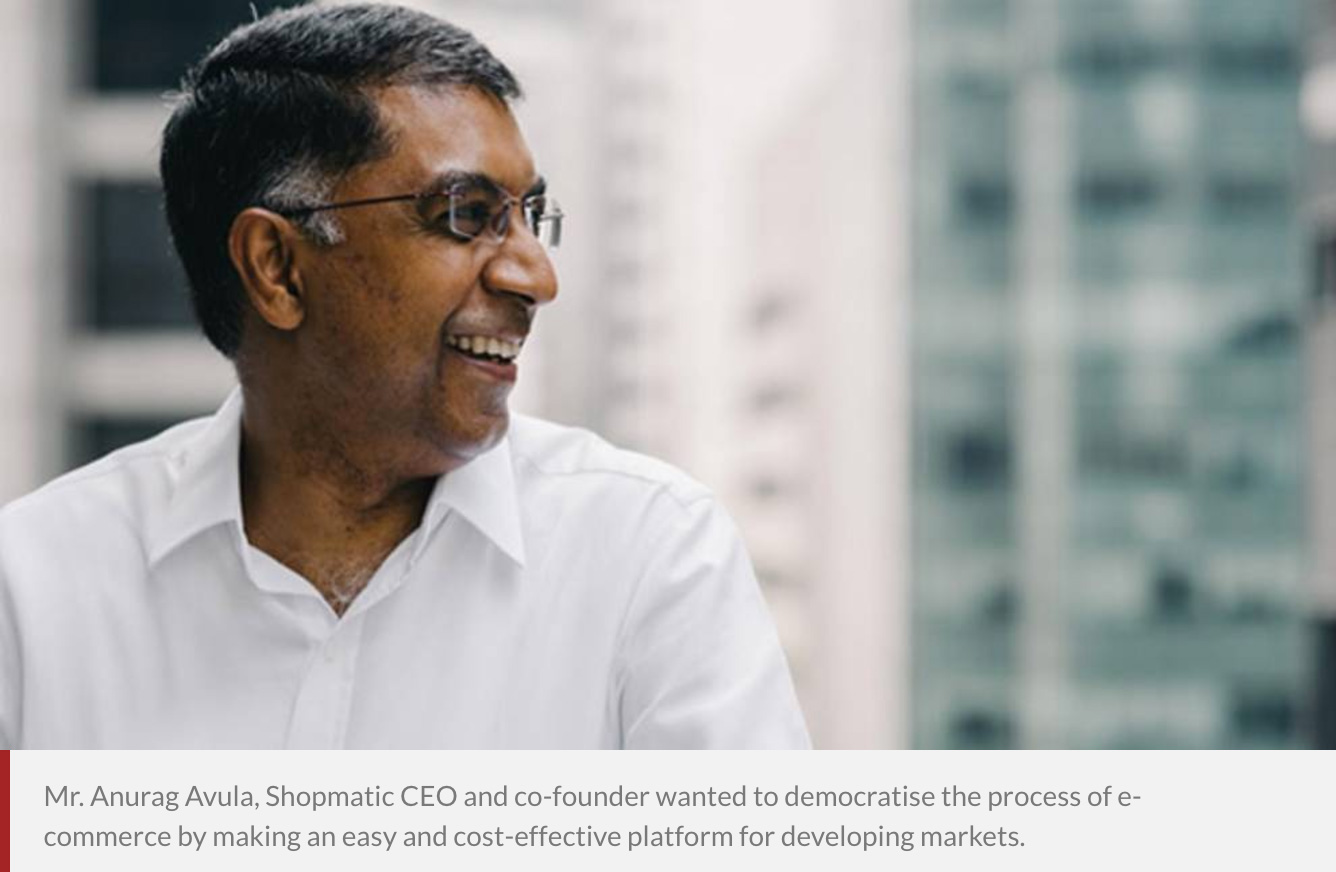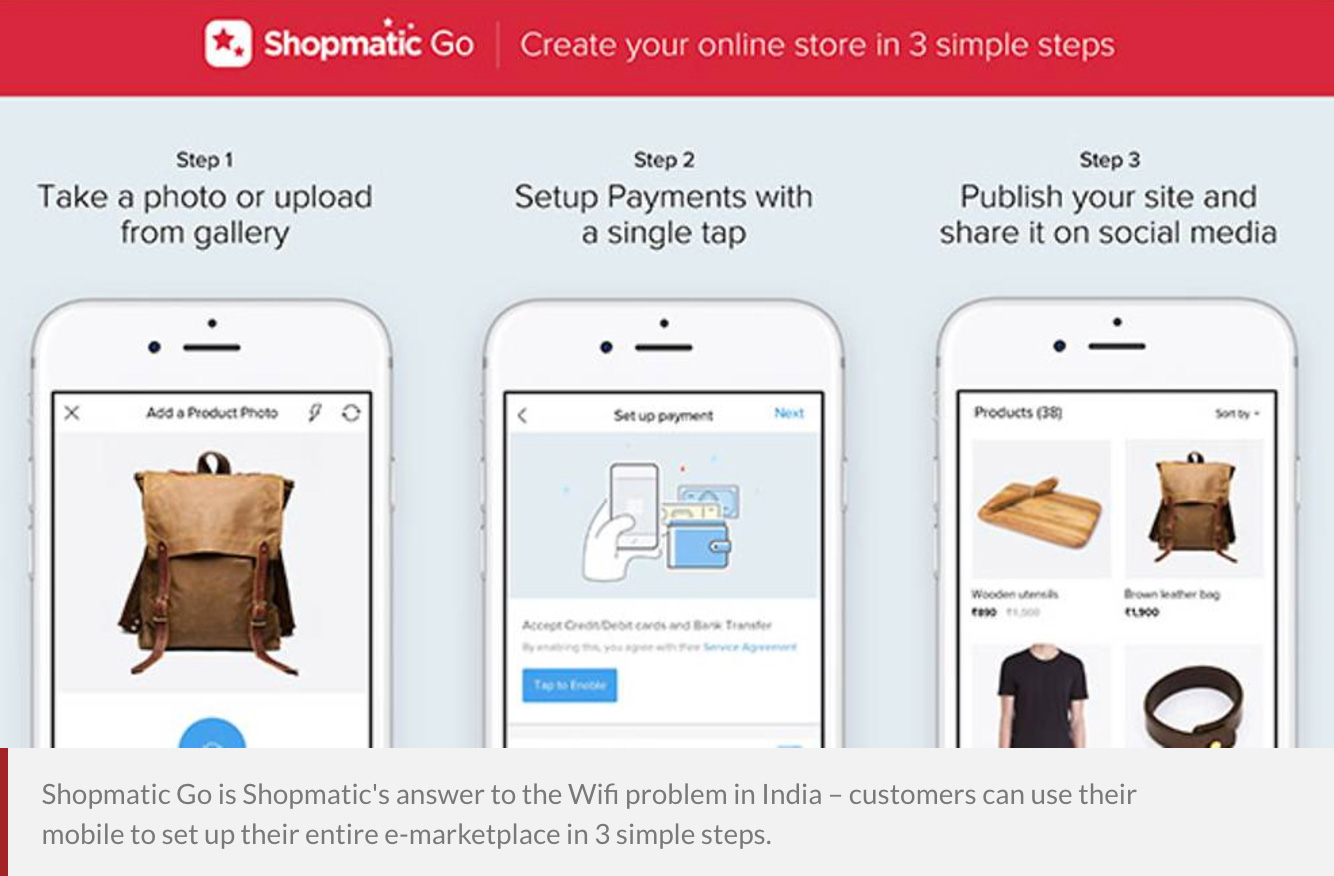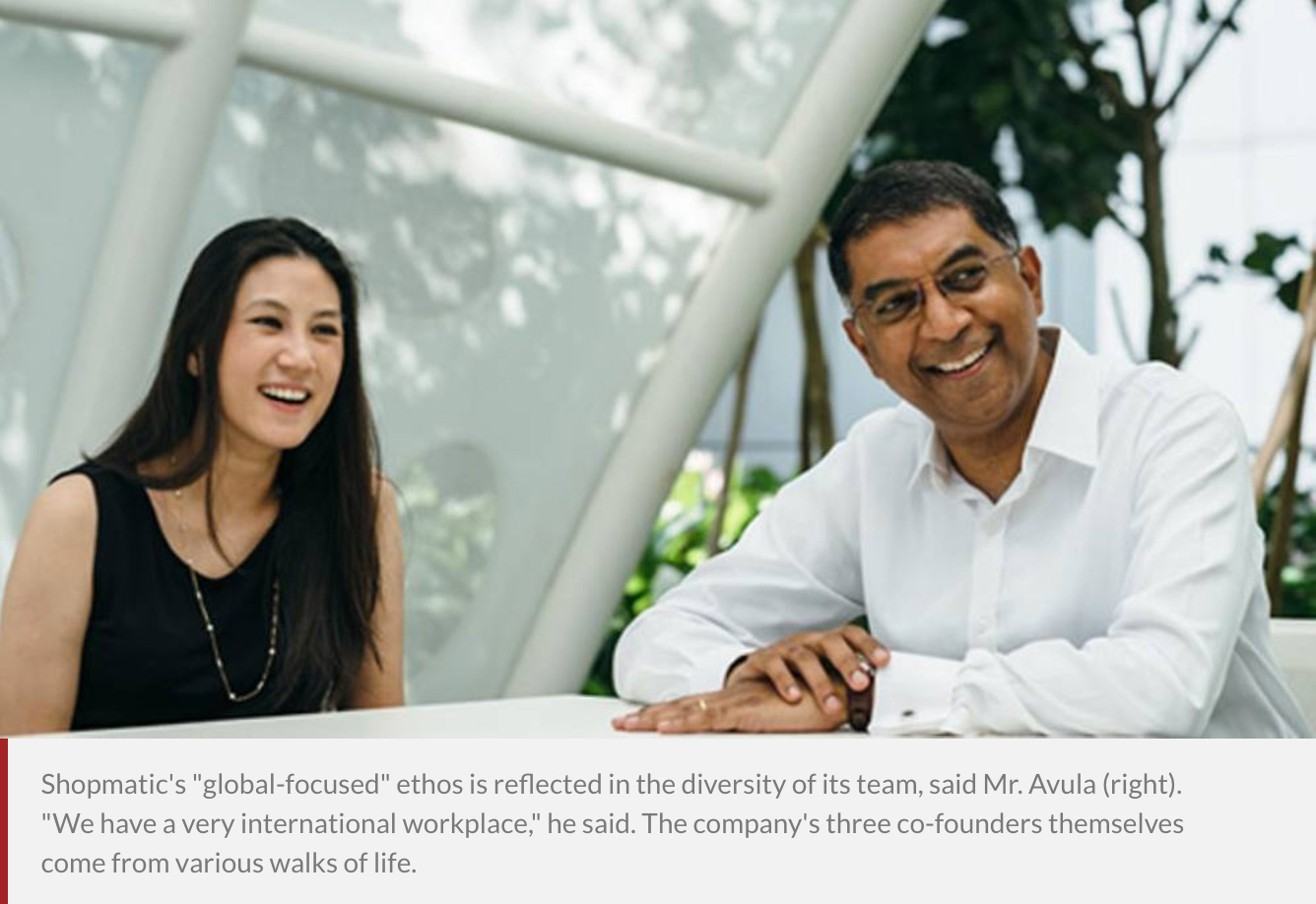Shopmatic may be based in Singapore but when the e-marketplace service provider start-up launched, it went global first — entering the challenging but promising Indian market even before Singapore’s. By 2020, Shopmatic is poised to enter 20 markets with IE Singapore as a partner.

When homegrown e-marketplace service provider start-up Shopmatic says they were “thinking global from day one”, they don’t just mean figuratively.
“We actually launched in India first, and then in Singapore four or five months later,” said Shopmatic CEO and co-founder Mr. Anurag Avula. “A month after that, we were in Hong Kong.”
It was an unusual strategy, Avula conceded — choosing to first launch their business abroad before establishing themselves on home turf. The speed at which the company expanded their global footprint was also remarkable. Within six months of launching their e-commerce service platform in January 2016, Shopmatic had established itself in three countries across Asia. And the company is showing no signs of stopping.
Shopmatic is planning to expand to three more markets, including the Middle East, in 2017. By 2020, the firm says it hopes to be in a total of 20 markets all over the globe.
This global-first approach and “tremendous” pace of growth may seem atypical, said Avula, but Shopmatic — which has been working with IE Singapore since 2016 to achieve its international goals — is banking on this bold strategy to keep ahead of the curve, and the competition.
“Some companies believe that you have to build your base here in Singapore first… but for us, we were thinking global from day one,” said Avula. “The Singapore market is great and it’s important to us, but it’s equally if not more important to leverage the opportunities that other global markets have.”
Shopmatic says it also wants to move fast to ensure it is establishing a foothold for itself in the growing e-commerce landscape in emerging markets in both Asia and beyond.
“Our goal is to extend our footprint into multiple emerging economies,” said Avula. “It’s a tougher route, clearly. You’re going into countries that don’t necessarily understand e-commerce. So you work with that and build for that. But when the comprehension comes in and when there’s a tipping point in the market, then you’re very well placed to leverage the benefits that accrue out of that.”

Shopmatic’s online platform, which helps both companies and individuals bring their businesses online, was specifically tailored for developing markets, Avula said.
The easy-to-use DIY platform is localised for each market and includes “all the pieces of the e-commerce ecosystem” — from built-in analytics and inventory management tools to payment and shipping options. It also helps users to list their products on online marketplaces such as eBay, Amazon and Lazada. Users can also seek advice from Shopmatic’s e-commerce consultants who can help enterprises both big and small set up their online stores and figure out how to boost sales.
“We wanted to build a platform that allowed anyone who wants to sell online to be able to do that — whether it’s a small business or an individual entrepreneur who sells wonderful cakes from home,” said Avula. “We wanted to democratise the process, making it easy, simple and cost-effective.”
On the regular Shopmatic platform, sellers can set up an entire store in 15 minutes or less, said Avula. On Shopmatic Go, the free mobile version of the platform, a fully-functioning store can be put together in under 3 minutes.
Shopmatic’s localised products with a global-centric approach appears to be serving the company well. Their full-stack platform has 50,000 users to date, said Avula. Shopmatic Go, which was launched in November 2016, has more than 100,000. But with all the success comes challenges too.
In India, for example, the company learned early on how important it was to “localise and customise” in a country so vast and diverse. “We also overestimated the technology infrastructure there,” said Avula. Access to Wifi, for instance, is limited and unreliable for large swathes of the country. The company also discovered that though India’s IT sector is globally-recognised, e-commerce in particular remains an underdeveloped area which requires much more education.

But staying nimble and adaptive helped the company survive and thrive, said Avula. Wifi might be spotty, but smartphone penetration in India is extremely high, with over 320 million smartphone users in the country. Also, though e-commerce education was lacking, Shopmatic discovered that millions of small business owners and “mompreneurs” were using platforms like Facebook to sell their goods and services.
Shopmatic thus decided, much earlier than planned, to launch Shopmatic Go to cater to these smaller-scale merchants and entrepreneurs who could use their mobile phones, at no cost, to quickly and seamlessly set up an online store. “We always knew we had to go mobile, but after learning from our experiences in the first 6 months, we decided to expedite the process,” said Avula.
The decision ultimately paid off. Shopmatic said they had been expecting about 8,000 users on the mobile platform within the first few months of launch; instead, within four months, 100,000 had signed up. Sixty percent of users on the platform are small-scale enterprises, said Avula. “It’s changed the game for us.”
India is targeted to make up 75 percent of Shopmatic’s business in 2017. The company says it plans to continue to grow its business there. IE Singapore, which provided grants to the company to open offices in the cities of Bangalore and Gurgaon, is currently working to connect the firm to local governments and partners — connections that could further boost Shopmatic’s reach in the country.
“IE’s financial assistance has been great, but it’s the non-financial help that’s really helpful,” said Avula. “IE connects us with partners who can further our value proposition, making us more competitive and allowing us to offer more to our customers.”
“IE has made our lives a lot easier,” Avula added.

Shopmatic has big plans for the coming years. Indonesia, the Philippines and the Middle East are markets they’re targeting in 2017. The company says it also sees Africa and Latin America in its near future.
IE Singapore continues to help Shopmatic to achieve its global aims, helping the company identify and conduct research into potential target markets and connecting the firm with local partners and other contacts.
“As a start-up with global aspirations, it’s been a challenging journey at times, but IE has been a fantastic partner,” said Avula. “They’ve given us a good knowledge base in some markets, like the Middle East and Africa, where we started off with absolutely no knowledge. They’ve connected us with some partners and large companies that would have been challenging for us to access alone.”
“I don’t expect anyone to come in and help us run our business, but it’s been so helpful to have someone come in and help us shorten the starting-up process,” Avula added. “IE has been that great bridge for us.”
In the Middle East, where Shopmatic is working to incorporate an entity in the United Arab Emirates, IE is helping the company navigate the regulatory environment and to connect the firm with the UAE government.
“Helping us to engage with local governments has been one of the biggest value-adds from our partnership with IE,” said Avula. “That’s huge. For a company that’s just starting out, that help has just been phenomenal.”
Source: Channel News Asia
